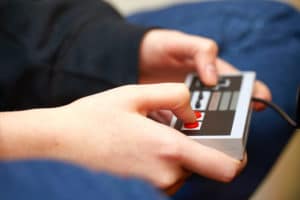The Fight for Donkey Kong Nintendo v. Universal
Most people know the name Donkey Kong and many will have fond memories of playing the original game years ago. Others who are younger will remember newer games with DK, as well as his presence in popular games like Mario Kart. However, what you might not have known about this beloved and iconic character is that he almost wasn’t a part of Nintendo. Let’s take a trip back in time to see how it all played out.
A Confusing Battle of Giant Apes
In 1981, Donkey Kong arrived in arcades courtesy of a company called Nintendo. This game turned out to be extremely successful and was popular enough that the game spawned a host of other types of merchandise, such as clothing and toys. With the rise in popularity of the game and merchandise, it garnered the attention of a man named Sid Sheinberg, who was the president of MCA and Universal Studios City. When the company looked into Donkey Kong, they believed that it was an infringement on King Kong.
Rather than talking directly with Nintendo, they decided to go after some of their licensing partners, namely Coleco and Tiger Electronics. It is important to note that Tiger Electronics was actually a subsidiary of Universal. The president of Coleco, a man named Arnold Greenburg said that they would pay Universal 3% of the royalties from Donkey Kong so they would not get sued. Tiger Electronics, however, did not cave to Universal’s demands, believing that Universal did not even actually have the rights to King Kong.
It was around this time that the attorney for Nintendo, Howard Lincoln, was considering settling with Universal. However, he decided not to settle, as he was not sure whether they had rights to King Kong either. This meant that the lawsuit was going to go forward.
At this point, Universal was concerned that Nintendo might countersue them, and they had Tiger Electronics make changes to Mario’s hat in the Donkey Kong handheld game.
The lawsuit was filed in June of 1982, and less than a year later, they sent cease and desist letters to licensees that were a part of Nintendo and making Donkey Kong products. Most of the licensees complied. Lincoln hired a well-known and highly successful attorney named John Kirby to represent them and research the case. Kirby discovered that the designer of Donkey Kong, Shigeru Miyamoto said that the character was originally called King Kong. According to Miyamoto, this was a term that meant large ape in a generic sense.
Universal claimed that the stories were too similar between the properties, but Kirby was able to show that there were many differences between them. He also said that Universal did not have the rights to King Kong. The reason he believed this was because Universal had previously sued RKO in order to prove that the plot to King Kong was actually in the public domain at that point.
The courts agreed and it was a massive loss for Universal. The judge even said that Universal did not even own the rights to King Kong and that they should not have attempted to claim those rights when it would serve to help them. Due to the cease and desist letters that had been sent, Nintendo was awarded damages in the case. The two subsequent appeals that universal attempted were failures, as well.
While this story is interesting on its own, the name of the attorney John Kirby should be familiar as well. At least his last name would be familiar to Nintendo fans, as the name of the beloved character Kirby was used to honor the attorney’s work.

